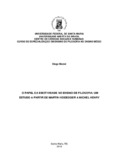| dc.contributor.advisor | Gallina, Albertinho Luiz | |
| dc.creator | Maciel, Diego | |
| dc.date.accessioned | 2018-09-05T11:43:39Z | |
| dc.date.available | 2018-09-05T11:43:39Z | |
| dc.date.issued | 2018-07-12 | |
| dc.date.submitted | 2018 | |
| dc.identifier.uri | http://repositorio.ufsm.br/handle/1/14192 | |
| dc.description | Artigo (especialização) - Universidade Federal de Santa Maria, Centro de Ciências Sociais e Humanas, Curso de Especialização em Ensino de Filosofia no Ensino Médio, EaD, RS, 2018. | por |
| dc.description.abstract | This article aims to present and highlight the importance of emotionality in teaching philosophy. The study of emotionality arises because of the need to explore the fertile fields of affection related to being in the world, which will require us, in the first instance, to make a theoretical foundation of such a question, namely the vision of the "affectivity" in traditional authors of philosophy. In this way, we use two authors which will serve as a solid basis for the research. They are Martin Heidegger and Michel Henry. In this sense, through the term Dasein, brought to light by Heidegger, we begin to analyze the being in the world; according to the philosopher, Dasein in the world will be the main means of access to affectivity, for Dasein "being-there" becomes involved with the world through the emotional dispositions which make it capable of feeling, creating and desiring. Already Michel Henry intends to take a leap forward in this affective purpose and magnifies the discussion, while he presents the phenomenology of life. In this sense, his proposal is to present life as a means of accessing all things through self-affectation, thus bringing human existence as an experience to the world. Both Heidegger and Michel Henry want to demonstrate that affectivity is related to being, which demonstrates and affirms that affective relationships call the mode of being "being" in the world. This leads us to emphasize its importance for teaching philosophy, where it is necessary to insert and develop it in the curriculum, where it can stand out in relation to the traditional way of being presented, giving a new meaning to teaching, based on the needs of the students. | eng |
| dc.language | por | por |
| dc.publisher | Universidade Federal de Santa Maria | por |
| dc.rights | Acesso Aberto | por |
| dc.rights | Attribution-NonCommercial-NoDerivatives 4.0 International | * |
| dc.rights.uri | http://creativecommons.org/licenses/by-nc-nd/4.0/ | * |
| dc.subject | Afetividade | por |
| dc.subject | Filosofia | por |
| dc.subject | Vida | por |
| dc.subject | Ser | por |
| dc.subject | Affectivity | eng |
| dc.subject | Philosophy | eng |
| dc.subject | Life | eng |
| dc.subject | Being | eng |
| dc.title | O papel da emotividade no ensino de filosofia: um estudo a partir de Martin Heidegger a Michel Henry | por |
| dc.title.alternative | The role of emotiveness in teaching philosophy: a study of one from Martin Heidegger a Michel Henry | eng |
| dc.type | Trabalho de Conclusão de Curso de Especialização | por |
| dc.degree.local | Polo de Santa Maria, RS, Brasil | por |
| dc.degree.specialization | Ensino de Filosofia no Ensino Médio, EaD | por |
| dc.description.resumo | Este artigo objetiva apresentar e ressaltar a importância da afetividade no ensino de filosofia. O estudo acerca da afetividade surge devido à necessidade de explorar os campos férteis do afeto, relacionados ao ser no mundo, o que vai nos exigir, em primeira instância, que seja feita uma fundamentação teórica de tal questão, a saber, a visão da “afetividade” em autores tradicionais da filosofia. Desta forma, nos utilizamos de dois autores os quais vão servir de base sólida para a pesquisa. São eles Martin Heidegger e Michel Henry. Neste sentido, através do termo Dasein, trazido à tona por Heidegger, passamos a analisar o ser no mundo; segundo o filosofo, o Dasein, no mundo, será o principal meio de acesso à afetividade, pois o Dasein “ser-aí” se envolve com o mundo através das disposições emotivas as quais o tornam capazes de sentir, criar e desejar. Já Michel Henry pretende dar um salto a mais neste proposito afetivo e engrandece a discussão, ao passo que ele apresenta a fenomenologia da vida. Neste sentido, sua proposta é apresentar a vida como meio de aceso a todas as coisas, através da auto-afectação, levando, desta forma, a existência humana como uma experiência junto do mundo. Tanto Heidegger quanto Michel Henry pretendem demostrar que a afetividade está relacionada com o ser, o que demostra e afirma que as relações de afeto denominam o modo do ser “ser” no mundo. Isso nos leva a ressaltar sua importância para o ensino de filosofia, onde se faz necessária sua inserção e desenvolvimento na grade curricular, onde ela possa se sobressair em relação à maneira tradicional de ser apresentada, dando um novo sentido ao ensino, pautado nas necessidades dos alunos. | por |
| dc.publisher.country | Brasil | por |
| dc.publisher.initials | UFSM | por |
| dc.subject.cnpq | CNPQ::CIENCIAS HUMANAS::FILOSOFIA | por |
| dc.publisher.unidade | Centro de Ciências Sociais e Humanas | por |



